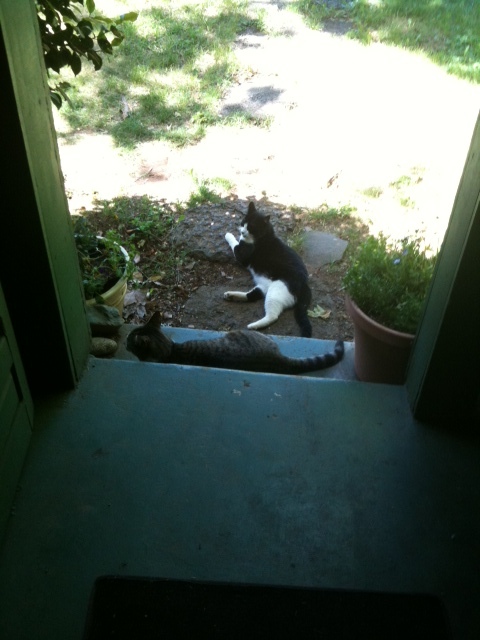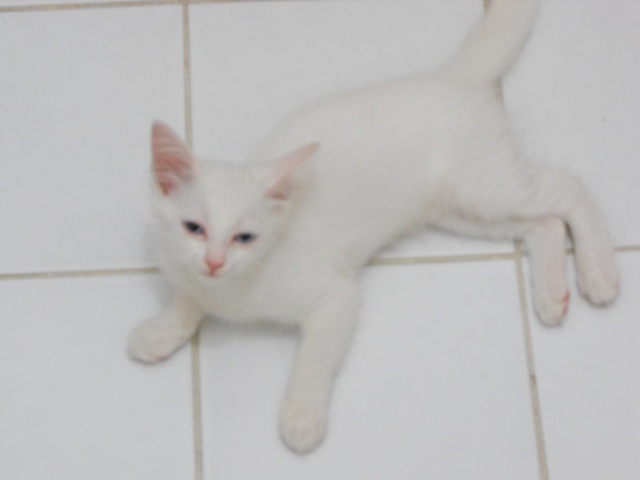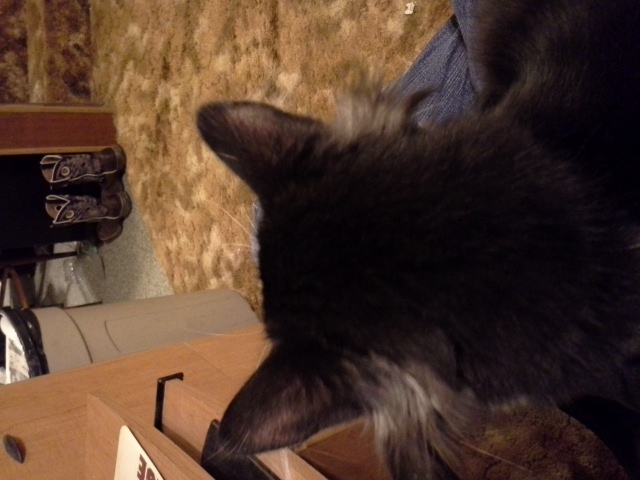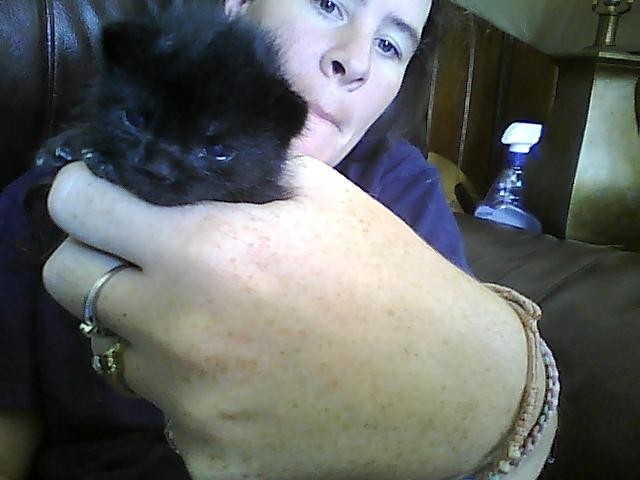QuestionDear Ali,
We just brought a new kitten home from the shelter. She has had her vaccinations except the anti rabies which will happen next week. She is constantly kneading her paws. She eats all the time and drinks a LOT of water. Her abdomen seems really distended and on one side, when I press my fingers into her tummy, that spot retains finger indentations for a bit. She is pretty active but seems rather warm. She also purrs quite a bit. Now I've had a kitten die before on me, I'm really scared this one will too although she seems pretty active. I will be going to the vet but here in Hyderabad India, the vets are pretty clueless about cats, they know a lot more about dogs. Please help me. I'm so scared I'll lose her too. Should I restrict her food or have her eat chicken instead? She currently eats whiskas dry catfood.
AnswerHuda,
Unfortunately since I am not a veterinarian I don't have the ability to diagnose any medical issues or prescribe any medical treatments. That having been said there are a few things in the history that you've provided that could be signs of potentially serious issues based on my experience. I don't know how old the kitten is, when she was taken from her mother, what sort of conditions she lived under before coming into the shelter, how clean the shelter itself is (in other words how much attention they pay to washing their hands between handling different animals, isolating sick animals in a quarantine ward, cleaning cages and examining tables, etc), how recently the kitten was vaccinated, what she was vaccinated for and what sort of conditions she was living under within the shelter itself which means that I have very minimal information about this kitten's history. There are also differences as to what common health problems exist based on geographical area and the resources that any given area has to care for pets in shelters as well as in private homes.
In general the importance of pets differs depending on what part of the world you're in, this means that the care of companion animals will also differ depending on their perceived importance within the society. In Canada it's not uncommon for pets to be treated somewhat like furry children and in some cases these pets are spoiled to the point of excess and well beyond. The medical care that pets receive and the competence of the vets that provide it also is affected by the overall role of companion animals within any given area. For instance in a country where many people are living in poverty and facing a daily fight to survive pets may not receive the same attention, medical care or quality diet as they will in a country where the vast majority of people live relatively well and are reasonably financially comfortable in terms of being able to afford the basic necessities of life such as nutritious food, safe, comfortable housing, etc. I'm not sure what good veterinary care costs in India or how likely you really are to find a vet that's competent, well educated and able to provide up to date medical care in your specific area, but I can offer some possibilities about what may be causing this kitten's belly to be distended.
First and foremost an important issue with any kitten is to have them treated for internal parasites - dewormers like Strongid T or Drontal are most commonly used in my area of the world and for the most part they are relatively effective. A kitten with a relatively high intestinal parasite burden can sometimes have a pot bellied appearance and treating her appropriately through the use of conventional medicines or safe alternative therapies is a good idea to do just as a matter of course. There is a possibility that the kitten's distended abdomen is an indicator of much more serious issues than a bad case of intestinal parasites and if this is the case then it will be very important to find a good vet who knows about cats (or is at least willing to learn) and have this baby assessed further just to find out conclusively what's wrong. There's a chance that the news you get will be bad, kittens can sometimes be born with congenital defects of the major organs in their body that will seriously affect their chances of living a healthy life in the long term so it's best to get on having this baby assessed ASAP because some defects only require the right treatment or surgery to correct them and help your kitten be stronger and healthier over the course of their lives.
If you have a digital thermometer that can be used to take the kitten's temperature rectally then this is something that you can do at home that will help to give you a better idea of how this kitten's doing at this point and whether she might be fighting off some sort of infection. The most effective way to check a cat's temperature is to do so rectally so I'd recommend that you pick up a thermometer just for the kitten because you really won't want to reuse the thermometer on a person after you've taken the kitten's temperature. Normal body temperature in a cat should be between 100.5-102.5 degrees Farenheit although it may vary slightly either way. If the kitten's temperature is 103 degrees Farenheit or higher she should see a vet immediately for treatment. In order to take the kitten's temperature safely here are the steps you'll need to follow:
1) Have someone that is completely comfortable with cats hold the kitten gently but firmly enough to prevent her from wiggling around too much and possibly causing herself serious injury. Ideally the kitten's bottom should be facing you and she should be as still as possible because if she moves around too much or the thermometer is inserted too roughly or too far there's a risk of perforating her bowels which would in all likelihood prove fatal.
2) Lubricate the tip of the thermometer using petroleum jelly (Vaseline) or a water based lubricant such as KY Jelly so that the thermometer will slide more easily into the kitten's rectum.
3) Gently slide the thermometer into the kitten's rectum about an inch or so. If you encounter resistance STOP and wait for the kitten to relax then proceed gently and with caution, after all you don't want to hurt her you simply want to know whether or not she's got a fever.
The fact that this kitten is fairly active is likely a good sign, but there are other indicators of wellbeing that you should keep an eye out for. Your kitten should be growing relatively rapidly if she's under 6 months or so of age, she should also be playful, alert and responsive to her environment. If you notice any eye or nasal discharge she should see a vet just in case she develops an upper respiratory infection because these can prove fatal for young kittens since their immune systems aren't well developed enough to fight off these infections. You've mentioned that the kitten kneads her paws frequently, I'm assuming that she pairs this with purring which would mean she's a pretty happy girl. When kittens purr and knead their paws they're essentially copying the behavior that let their mother know they were comfortable and content while they were nursing. As far as nutrition goes I personally wouldn't feed the kitten Whiskas or other similar foods because I don't feel that they're safe, species appropriate or nutritionally adequate for cats of any age. If you'd like further information on high quality species appropriate nutrition that should help your kitten live a long, healthy life I'd recommend checking out the following websites:
- www.catinfo.org
This is the site that our family vet recommended to me when I asked her about making my cats their own food at home. This recommendation was made after the Menu Foods pet food recalls of 2007 when I nearly lost my eldest cat after she ate a commercially prepared cat food that's still touted at the best food you can feed and highly recommended by veterinarians.
- www.catnutrition.org
This site is referred to quite a bit by Dr. Lisa Pierson, DVM, she's the vet who created catinfo.org. I like this site because it explains things in more detail and there's a higher yield cat food recipe that's more appropriate for multiple cat households.
- http://www.halopets.com/pet-education/pet-articles/pet_food_what_you_need_to_kno...
This article is one that I believe any pet parent should read before choosing the diet they want to provide for their cats. I will warn you that this article has some disturbing content and if you have a sensitive stomach you definitely won't want to read this at mealtime, but it offers information that's helpful. The article helps pet parents get a better understanding of what the terms that nobody understands on the pet food labels really mean and the reality is that it's shocking for most pet parents.
I would also recommend that you research the use of vaccines carefully since your kitten is young since over-vaccinating your kitten could potentially cause serious health problems later on in her life. Much of the research out there suggests that pet parents could potentially vaccinate their cats as kittens properly then not vaccinate them again except for those vaccines required by law in your area so it's definitely something to spend more time considering. If you do want me to pass along websites you might find useful on this subject I'd be more than happy to do so. If you have any further cat related questions or concerns please don't hesitate to contact me again, I'll do my absolute best to help you out.

 wonderin??
Question
CIara
Hi Karen,
This is my first time dealing
wonderin??
Question
CIara
Hi Karen,
This is my first time dealing
 2 sibling cats. one of the brothers just passed.
Question
Their last day togethe
how should i dea
2 sibling cats. one of the brothers just passed.
Question
Their last day togethe
how should i dea
 Kitten breed
Question
Minnoo
Dear Sir,
I brought home a female kitte
Kitten breed
Question
Minnoo
Dear Sir,
I brought home a female kitte
 Can you give me an idea for possible cat breed?
Question
Tufts Maverick
My cat Maverick ha
Can you give me an idea for possible cat breed?
Question
Tufts Maverick
My cat Maverick ha
 teething
Question
wally
i have a orphened kitten i have b
teething
Question
wally
i have a orphened kitten i have b